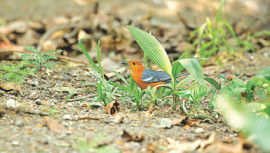Coral bleaching, a deadly disease that strikes reefs when oceans heat up, has risen nearly five-fold since the 1980s, threatening the future of these vital ecosystems, researchers said Thursday.
Severe coral bleaching events used to happen once every 25 to 30 years. Now, they occur every six years on average, said the report in the journal Science.
"Before the 1980s, mass bleaching of corals was unheard of," said lead author Terry Hughes, director of the Australian Research Council (ARC) Centre of Excellence for Coral Reef Studies.
"But now, repeated bouts of regional-scale bleaching and mass mortality of corals has become the new normal around the world as temperatures continue to rise."
Millions of people worldwide depend on corals for their livelihoods, whether for tourism or scuba diving, or for the fish and sea creatures that make their homes in reefs.
When water temperatures rise suddenly, algae in the corals can die, cutting off an important source of nutrients. If warming persists for several months, corals can turn white and die.
The study analyzed bleaching events at 100 locations around the world between 1980 and 2016.


































